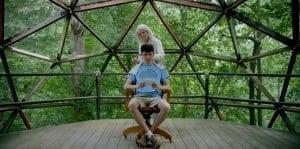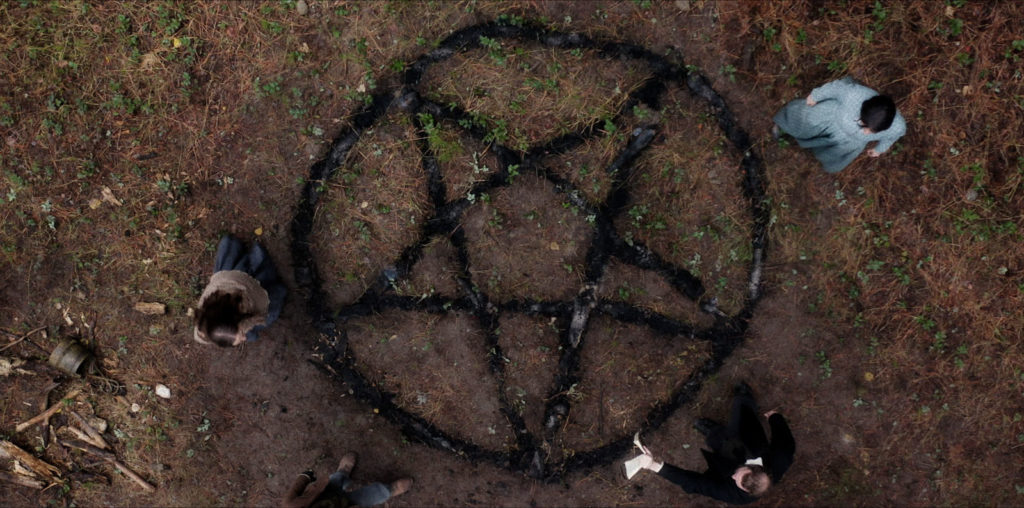
In a lot of ways, The House of Tomorrow doesn’t deviate all that much from the many, many cinematic tales of lonely, withdrawn teenagers learning to come out of their metaphorical shells.
In this case, though, the “shell” itself is a particularly fascinating one.
The film’s 16-year-old protagonist, Sebastian (Asa Butterfield), has lived much of his life enclosed in a geodesic dome designed by the real-life Atomic Age futurist Buckminster Fuller, whose eccentric-looking but forward-thinking forays into architecture, vehicle design, and sustainability envisioned a utopian ideal for technology-driven society.
Dubbed “The House of Tomorrow,” the dome-home during the day serves as a kind of living museum to the late Fuller’s work and ideas (or, less charitably, an oddball tourist attraction) presided over by Sebastian’s grandmother and guardian, Josephine (Ellen Burstyn). Josephine is a former colleague and zealous disciple of “Bucky” – she still gets misty-eyed during the aging video presentation that greets visitors to the House – and has raised Sebastian quasi-off-the-grid as an experiment in Fuller-inspired child development.

“…homeschooled savant and cynical punker bond over their respective weirdnesses…”
As might be expected given that kind of upbringing, Sebastian has grown into an intelligent but socially awkward teenager, subservient to his grandmother and her worship of Bucky’s way of life. However, it’s another, much more traditional, type of faith that shows up to indirectly but powerfully rock Sebastian’s world. When an Evangelical church youth group takes a field trip to the House of Tomorrow, Sebastian meets group leader Alan (Nick Offerman), a textbook suburban dad-type (right down to the fanny pack and sparkling white mid-calf socks), who sees in him a wholesome potential friend for his rebellious, likably sarcastic son Jared (Alex Wolff).
That friendship does indeed come to blossom – slowly – as Jared, at first incredulous and reluctant, shares with Sebastian his infatuation with vintage punk rock as well as the fact that he’s recently had a heart transplant and his days on earth might be numbered. What develops is an instantly endearing camaraderie, as homeschooled savant and cynical punker bond over their respective weirdnesses and eventually endeavor to start their own punk band – though Jared’s health and Sebastian’s ties to his grandmother and the House of Tomorrow increasingly throw roadblocks in their way.
Writer/director Peter Livolsi (adapting a novel of the same name by Peter Bognanni) displays an adeptness with characterization that’s truly impressive for a first-time feature director, fleshing out personalities and avoiding easy signifiers. Sebastian, as sheltered a life as he’s led, isn’t overly naïve or dorky, and he greets the world outside of the House of Tomorrow with enthusiasm rather than trepidation; Jared, meanwhile, loves punk more for its cathartic bang-on-an-instrument abandon than its anti-authoritarian excesses, and he clearly has a good heart even if it originally belonged to someone else. The screenplay has a fine ear for how young adults relate to one another, and the bonding scenes between the two leads strike a keen balance between wittiness and plausibility.

“…has heart, a lot of it, and it regularly delivers moments that are disarmingly sweet and perceptive…”
Even more refreshingly, that same roundedness carries over to the supporting characters, as well. Alan – questionable wardrobe choices and youth-group leadership aside – isn’t at all the Ned Flanders-like square he could be, and he comes off as an uncommonly sympathetic parental figure in a genre that can’t claim too many of them. And while Josephine is even more dogmatic a true believer than Alan is, it’s clear she’s desperate to hold on to something that’s at least somewhat worth fighting for. None of these characters is ever made to appear ridiculous just for an easy laugh or dramatic moment, and coupled with all-around stellar performances from both the veteran actors and relative newcomers, this provides the film a solid emotional core. The House of Tomorrow has heart – a lot of it, in fact – and it regularly delivers moments that are disarmingly sweet and perceptive.
All that said, The House of Tomorrow hits a lot of story beats that are wholly predictable, even perfunctory, and while individual scenes stand out really well– like Sebastian’s transcendent first experience listening to punk or an unexpected confession by Jared’s acid-tongued younger sister Meredith (Maude Apatow) – the film’s adherence to formula, in the end, makes it a little less than the sum of its parts. These characters are so dynamic, their struggles – on top of the already daunting challenges of simply being a teenager or a parent – so interesting, that it’s hard not to wish the story had something a bit more unique to do with them. This especially detracts during the film’s climax, which is well-staged and righteously stirring but hardly surprising; it’s too convenient a choice and too obligatory an outcome to completely give oneself over to.
Still, if it doesn’t quite become the coming-of-age classic that its terrific character work might have elicited, The House of Tomorrow is at very least a modest and well-made crowd-pleaser. Livolsi keeps things moving energetically and entertainingly throughout, buoyed by the film’s terrific soundtrack – both the burbling electronics of Rob Simonsen’s original score and a selection of well-curated punk tracks from the likes of The Germs and Black Flag. For a film that’s so wrapped up in the boundary-pushing ethos of both Buckminster Fuller and good, old-fashioned punk rock, though, it really could have pushed a few more boundaries of its own.

The House of Tomorrow (2017) Written and directed by Peter Livolsi. Starring Asa Butterfield, Alex Wolff, Nick Offerman, Ellen Burstyn, Maude Apatow, Michaela Watkins
3 ½ stars out of 5

